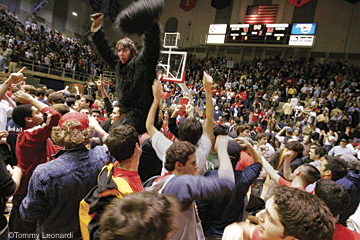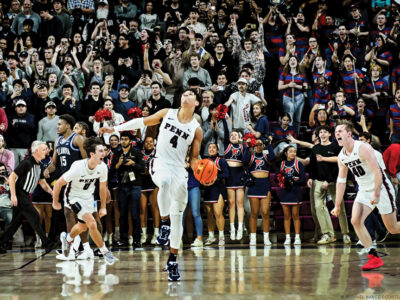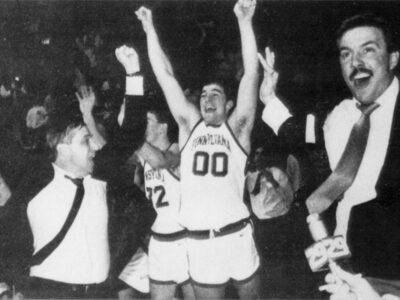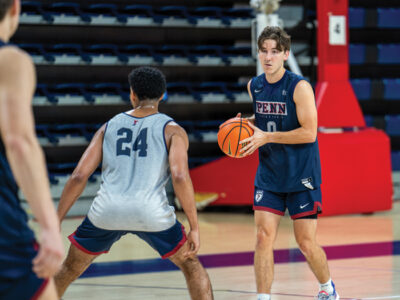
By David Porter | Two weeks into the new year, many Penn basketball fans were asking, “How much worse is it going to get?” An agonizing defeat at Temple had been followed by losses to Villanova, San Francisco, Illinois-Chicago, and, most gallingly, to Rider at the Palestra. Yet a month later, denizens of Red and Blue Nation were instead asking what this suddenly unbeatable team could do for an encore. As the season approached the halfway point, Penn stood with a commanding lead atop the Ivy League.
In those four short weeks, everything seemed to coalesce for the Quakers—a turnaround that culminated in a stunning come-from-behind overtime win over Princeton at the Palestra on February 8 that may live as one of the greatest victories in the 102-year history of college basketball’s best rivalry.
More on that in a bit. First, though, a trip through a magical month that found Penn both settling some old scores and carving out some new territory.
Viewed in hindsight, a journey to Loudonville, New York, home of Siena College, on January 15 may have been the tonic this team desperately needed. Penn had just lost to Rider in overtime at the Palestra three days earlier in a carbon copy of a game played in New Jersey the previous season. That made the subsequent trip to play Siena all the more important. The hapless Saints offered little resistance—amazingly, Penn’s bench players outscored Siena’s starters in the game—in the 89-62 throttling. Another cushy win, over a mediocre Lafayette team, provided further confidence-boosting leading into the annual Big 5 tussle with St. Joseph’s on January 25. This was not the same Hawks team of Jameer Nelson and Delonte West that reached the NCAA Elite Eight a year earlier, but the game figured to offer a true barometer of where the Quakers stood on the eve of the Ivy League season.
What it wound up doing was showcasing a Penn team that appeared to have hit its stride, but good. The Quakers clamped down on the Hawks defensively and raced to a 16-3 lead and never trailed thereafter, pushing aside a late St. Joe’s rally to win 67-59. The big play came from sophomore forward Steve Danley, who took an inbounds pass in the final minute and, with the defense expecting him to pass the ball, drove the baseline and threw down a righteous dunk to put the game out of reach.
Danley’s progress, along with that of fellow sophomores Ibrahim Jaaber and Ryan Pettinella, has been a huge factor in the Quakers’ success. All three possess an abundance of physical gifts and basketball smarts, but a season and a half under Dunphy has smoothed out some of the rough edges and made them into more efficient, and effective, players.
Danley’s coming-out party occurred on the weekend Yale and Brown invaded the Palestra, a 48-hour span in which one could almost sense the team’s hunger to avenge three losses to the two teams last season. Two of those came against Brown, and Penn coach Fran Dunphy made sure his players didn’t forget how the Bears’ slippery point guard Jason Forte had torched them for 29 points on the Palestra floor last season by screening films from the 78-74 loss. “I think we just wanted to remind them of how tough he was,” Dunphy said.
The players responded by confounding and frustrating Forte the entire evening, holding him scoreless in the first half. Offensively, Penn had perhaps its best 20-minute stretch since the Toole-Onyekwe-Archibong teams by making 19 of its first 25 shots and taking a 44-23 lead at intermission. Danley made all seven of his attempts and finished the game with a career-high 22 points, breaking his own personal record from a night earlier in a 65-41 thrashing of Yale. After the win over the Elis, Dunphy had allowed that serious changes had been contemplated during the team’s slump. “We were ready to go back to the drawing board, offensively,” he said. “But when we looked at the films, we were getting enough good looks. We just weren’t knocking them down.”
Comfortable wins at Harvard and Dartmouth followed, setting up round one of the annual conflagration with Princeton. This one found the Tigers backed into a corner after losses to Brown, Harvard and, inexplicably, Dartmouth. But they rocked the Quakers with a nearly flawless first half, then built an 18-point lead with 7:35 left in the game. Slowly, Penn chipped away at the lead. Senior guard Eric Osmundson scored seven points in 37 seconds—four on a 3-pointer and foul shot after he was knocked flying by a Princeton defender—to cut the lead to 10, and his two free throws in the final minute sent the game into overtime as the Palestra rocked. Tim Begley and Jaaber had key steals in the rally, and a full-court press thoroughly flummoxed the suddenly tentative Tigers.
Begley’s off-balance 3-pointer off the backboard in the extra period sealed the 70-62 victory, and when it was over Penn finally had exacted some payback for a 1999 loss at the Palestra in which the Quakers blew a 40-13 lead to the Tigers. “This is probably my favorite victory I’ve ever had in basketball,” an exhausted but euphoric Begley said later. Osmundson, who has proved to be a warrior this season after a so-so junior season, lauded the team’s “never-quit” attitude. Dunphy was characteristically circumspect. “If you’ve been around long enough, these things happen,” he said. “The one that went against us, that was probably the greatest [comeback] I’ve ever seen. But this was a helluva victory.”
It is worth noting that the Quakers have started 5-0 in the Ivy League seven times under Dunphy, and each time wound up winning or sharing the title. Was somebody still looking for an encore?Dave Porter C’82 writes for the Associated Press. Also see his feature profile of Marc Morial C’80 in this issue.




